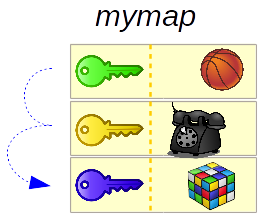(doseq [[k x] mymap]
(println k ":" x))
for C in My_Map.Iterate loop
Put_Line ("Key = " & Key (C) & ", Value = " & Element (C));
end loop;
for (auto entry : mymap) {
auto k = entry.first;
auto x = entry.second;
std::cout << k << ": " << x << "\n";
}
for (auto& [k, x] : mymap)
printf("%s %s\n", k, x);
for (const auto& [k, x]: mymap) {
std::cout << "Key: " << k << " Value: " << x << '\n';
}
K k;
X x;
auto i {mymap.begin()}, n {mymap.end()};
while (i not_eq n) {
k = i->first;
x = i->second;
printf("%s %s\n", k, x);
++i;
}
for (const auto& kx: mymap) {
std::cout << "Key: " << kx.first << " Value: " << kx.second << std::endl;
}
foreach(var entry in map)
{
Console.WriteLine("Key=" + entry.Key + ", Value=" + entry.Value);
}
int[string] mymap = ["Hello":1 , "World":2];
foreach (k, v; mymap)
writeln("Key: ", k, " Value: ", v);
mymap.forEach((k, v) => print('Key=$k, Value=$v'));
Enum.each(mymap, fn({k, x}) ->
IO.puts("#{k} => #{x}")
end)
for {k, x} <- mymap do
IO.puts("#{k} => #{x}")
end
maps:fold(
fun(K, V, ok) ->
io:format("~p: ~p~n", [K, V])
end, ok, MyMap).
for k, x := range mymap {
fmt.Println("Key =", k, ", Value =", x)
}
mymap.each { k, x ->
println "Key $k - Value $x"
}
let f k v = [show k, " = ", show v]
mapped = Map.mapWithKeys f mymap
in putStrLn $ intercalate "," $ mapped
Object.entries(mymap).forEach(([key, value]) => {
console.log('key:', key, 'value:', value);
});
for (const key in mymap) {
console.log('key:', key, 'value:', mymap[key]);
}
mymap.forEach((k,x) -> System.out.println("Key=" + k + ", Value=" + x));
for (Map.Entry<Object, Object> entry : mymap.entrySet()) {
Object k = entry.getKey();
Object x = entry.getValue();
System.out.println("Key=" + k + ", Value=" + x);
}
K k;
X x;
for (Entry<K, X> e : mymap.entrySet()) {
k = e.getKey();
x = e.getValue();
out.println(e);
}
mymap.forEach { k, v -> println("$k -> $v") }
mymap.entries.forEach { print("${it.key} ${it.value}") }
(loop for k being each hash-key of mymap
for x being each hash-value of mymap
do (format t "~A ~A~%" k x)))
for k, x in pairs(mymap) do
print('Key: '..k..', Value: '..x)
end
for (NSString *k in mymap)
NSLog(@"Key %@, value %@",k,mymap[k]);
foreach ($mymap as $k=>$x)
{
echo "Key=$k, Value=$x <br>";
}
for i := 1 to mymap.Count do
WriteLn(mymap.Keys[i], '=', mymap.Data[i]);
printf "Key=%s, Value=%s\n",$_,$mymap{$_} foreach (sort keys %mymap);
while (my ($k, $x) = each %mymap) {
print "Key=$k, Value=$x\n";
}
forall(get_dict(K, D, V),
format("~w:~w~n", [K, V]))
for k, v in mymap.items():
print(k, v)
for x in mymap.items():
print(x)
mymap.each {|k, x| puts "Key= #{k} Value=#{x}"}
for (k, x) in &mymap {
println!("Key={key}, Value={val}", key=k, val=x);
}
val x = Map("a" -> 1, "b" -> 2, "c" -> 3)
x.foreach{ case (key, value) => println(s"$key => $value")}
mymap.foreach { case (k, x) => println(s"$k => $x") }
mymap keysAndValuesDo: [ :k :x |
Transcript cr;
show: 'Key = ', k printString;
show: ', Value = ', x printString]


